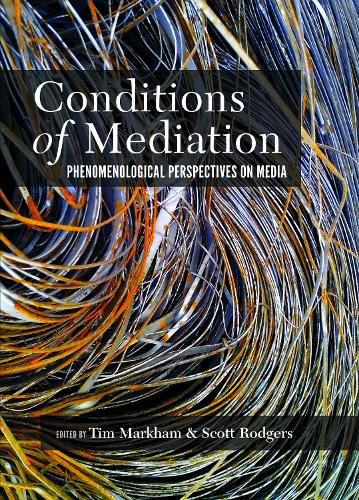Readings Newsletter
Become a Readings Member to make your shopping experience even easier.
Sign in or sign up for free!
You’re not far away from qualifying for FREE standard shipping within Australia
You’ve qualified for FREE standard shipping within Australia
The cart is loading…






This title is printed to order. This book may have been self-published. If so, we cannot guarantee the quality of the content. In the main most books will have gone through the editing process however some may not. We therefore suggest that you be aware of this before ordering this book. If in doubt check either the author or publisher’s details as we are unable to accept any returns unless they are faulty. Please contact us if you have any questions.
Phenomenology has become one of the most important philosophical traditions underpinning recent theory and research on new media, whether or not the word is used explicitly. Conditions of Mediation brings together, for the first time in a single publication, the diversity of phenomenological media research-from social platforms and wearable media to diasporic identity formation and the ethics of consumer technologies.
The new orthodoxy in media studies emphasizes the experience of media-whether as forms, texts, technics or protocols-marking a departure from traditional approaches preoccupied with media content or its structural contexts. But phenomenologically informed approaches go beyond merely asking what people do with media. They ask a more profound question: what constitutes the conditions of mediated experience in the first place?
Beginning with an accessible introduction, this book invites readers to explore a wide range of phenomenological perspectives on media via two critical dialogues involving key thinkers alongside a series of theoretically sophisticated and empirically grounded chapters. In so doing, interdisciplinary media studies is brought into conversation with the work of philosophers such as Edmund Husserl, Martin Heidegger and Maurice Merleau-Ponty, as well as phenomenologically-inspired thinkers such as Erving Goffman, Pierre Bourdieu, Tim Ingold, Henri Lefebvre, Friedrich Kittler, Marshall McLuhan and Bernard Stiegler.
$9.00 standard shipping within Australia
FREE standard shipping within Australia for orders over $100.00
Express & International shipping calculated at checkout
This title is printed to order. This book may have been self-published. If so, we cannot guarantee the quality of the content. In the main most books will have gone through the editing process however some may not. We therefore suggest that you be aware of this before ordering this book. If in doubt check either the author or publisher’s details as we are unable to accept any returns unless they are faulty. Please contact us if you have any questions.
Phenomenology has become one of the most important philosophical traditions underpinning recent theory and research on new media, whether or not the word is used explicitly. Conditions of Mediation brings together, for the first time in a single publication, the diversity of phenomenological media research-from social platforms and wearable media to diasporic identity formation and the ethics of consumer technologies.
The new orthodoxy in media studies emphasizes the experience of media-whether as forms, texts, technics or protocols-marking a departure from traditional approaches preoccupied with media content or its structural contexts. But phenomenologically informed approaches go beyond merely asking what people do with media. They ask a more profound question: what constitutes the conditions of mediated experience in the first place?
Beginning with an accessible introduction, this book invites readers to explore a wide range of phenomenological perspectives on media via two critical dialogues involving key thinkers alongside a series of theoretically sophisticated and empirically grounded chapters. In so doing, interdisciplinary media studies is brought into conversation with the work of philosophers such as Edmund Husserl, Martin Heidegger and Maurice Merleau-Ponty, as well as phenomenologically-inspired thinkers such as Erving Goffman, Pierre Bourdieu, Tim Ingold, Henri Lefebvre, Friedrich Kittler, Marshall McLuhan and Bernard Stiegler.